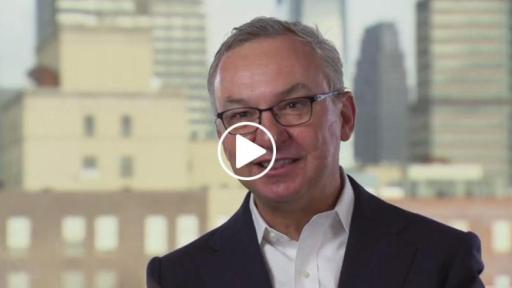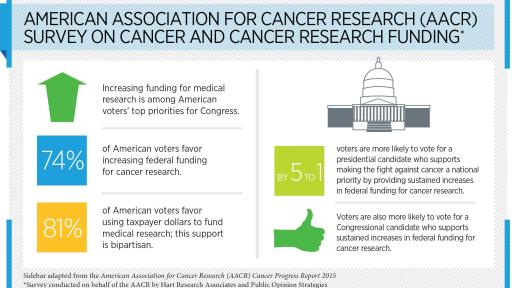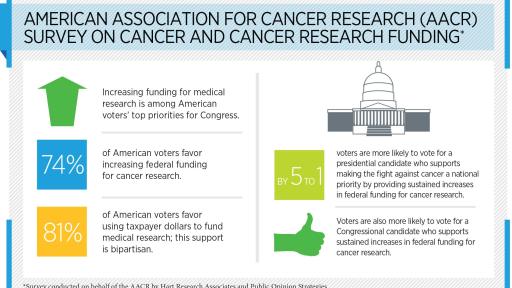
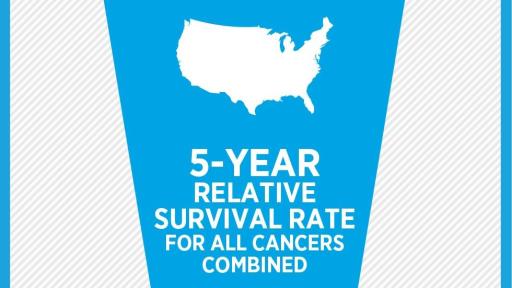

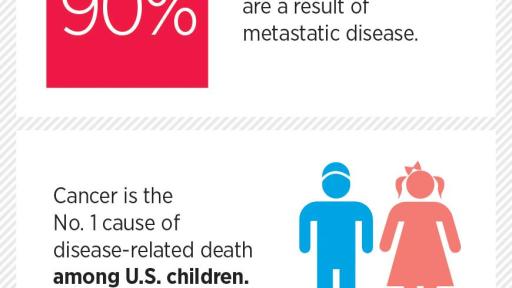

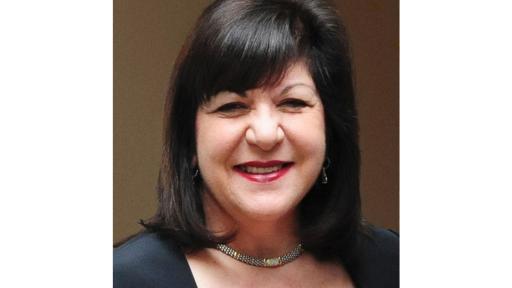
Sound Bites and B-roll for the Media
AACR Survey and Cancer Progress Report 2015 Video
AACR Survey on Cancer and Cancer Research Funding
The U.S. Five-year Survival Rate Increased to 68 Percent in 2010
FDA Approvals Between Aug. 1, 2014, and July 31, 2015
Facts About Cancer
José Baselga, MD, PhD
Margaret Foti, PhD, MD (hc)
Documents
AACR Survey on Cancer and Cancer Research FundingAmerican Association for Cancer Research National Survey Shows 74 Percent of Voters Want More Federal Funding for Cancer Research
New AACR Cancer Progress Report highlights the lifesaving advances that federal funding has made possible
PR Newswire, PHILADELPHIA
Nearly three in four American voters (74 percent) favor increasing federal funding for cancer research, according to the results of a new national survey conducted on behalf of the American Association for Cancer Research (AACR). The survey results were released today in conjunction with the AACR’s fifth annual Cancer Progress Report. The report highlights how federally funded research can power progress against cancer and urges Congress and the administration to implement a strategy for providing annual budget increases of at least 7 percent for the National Institutes of Health (NIH), National Cancer Institute (NCI), and U.S. Food and Drug Administration (FDA) in fiscal year 2016 and thereafter.
The national survey, which was conducted by Hart Research Associates and Public Opinion Strategies, shows that five out of every six voters recognize what the AACR Cancer Progress Report 2015 details: that progress is being made against cancer.
.@AACR national survey: 74% of voters want more federal cancer research funding. #CancerProgress15 Tweet
Key results from the American Association for Cancer Research survey on cancer and cancer research funding include:
- More than eight out of every 10 American voters (81 percent) favor using taxpayer dollars to fund medical research; this support for federally funded medical research is bipartisan.
- Nearly three out of every four voters (74 percent) favor increasing federal funding for cancer research, with nearly half (49 percent) of voters strongly favoring doing so.
- By five to one, voters say they would be more likely to vote for a presidential candidate who supports making the fight against cancer a national priority by providing sustained increases in federal funding for cancer research.
- More than five in six voters (85 percent) recognize that progress is being made against cancer.
- Among diseases and other major health issues, voters in all age groups are most worried about getting cancer.
- Nearly nine in 10 Americans (88 percent) know someone who has had cancer; almost half (47 percent) have a close friend or family member who currently has cancer.
“As we highlight in the AACR Cancer Progress Report 2015, we are making significant progress against cancer,” said José Baselga, MD, PhD, president of the AACR and physician-in-chief at Memorial Sloan Kettering Cancer Center in New York. “Unfortunately, at this time of great excitement, the decline in NIH funding that we have seen since 2004 threatens the pace of progress and undermines the promise of cures for patients.
“It is extremely heartening to see from the results of the survey that most American voters have the same message for Congress as the AACR—increasing funding for medical research should be a top national priority,” added Baselga.
The annual AACR Cancer Progress Report is a cornerstone of the AACR’s efforts to increase public understanding of cancer, to highlight the importance of cancer research to improve public health, and to advocate for increased federal funding for the NIH, NCI, and FDA.
Research Powers Progress Against Cancer
The AACR Cancer Progress Report 2015 details how federally funded research is improving lives, like the lives of the 13 individuals featured in the report who have shared their experiences with cancer. It also contains a special section showcasing the remarkable advances made against cancer in the five years of publishing the report.
Progress highlighted in the fifth edition of the AACR Cancer Progress Report includes:
- The U.S. five-year survival rate for all cancers combined increased from 49 percent in the mid-1970s to 68 percent in 2010.
- Between Aug. 1, 2014, and July 31, 2015, the FDA approved nine new anticancer therapeutics and new uses for six previously approved anticancer therapeutics.
- During the same period, one new cancer prevention vaccine and one new cancer screening test received FDA approvals, as did a previously approved imaging agent.
- Research discoveries continue to advance immunotherapy. Four of the nine new anticancer therapeutics are immunotherapy treatments.
- Cancer genomics research is the foundation for precision medicine. The number of FDA-approved molecularly targeted anticancer therapeutics more than doubled in the five years of publishing the report.
Cancer: An Ongoing Challenge and Costly Disease; Research: An Essential Investment
The report emphasizes that although extraordinary advances are being made against cancer, the disease continues to exert an immense personal and economic toll, both nationally and internationally. Also, cancer is primarily a disease of aging and because the portion of the U.S. population age 65 and older is expanding, the burden of cancer is expected to grow in the coming decades.
According to the report:
- More than 589,000 people in the United States are projected to die from cancer in 2015.
- Cancer is the No. 1 cause of disease-related death among U.S. children.
- The number of new cases of cancer in the United States is predicted to rise from 1.7 million in 2015 to 2.4 million in 2035.
- It is estimated that the direct medical costs of cancer care in the United States in 2010 were nearly $125 billion, and that these costs will rise to $156 billion in 2020.
The report states that the increasing economic and personal burden of cancer underscores the need for more research to develop new approaches to cancer prevention and treatment, and calls for Congress and the administration to provide the NIH, NCI, and FDA with annual funding increases that are robust, sustained, and predictable.
“We have made spectacular progress against cancer, which has saved the lives of millions of individuals in the United States and around the world,” said Margaret Foti, PhD, MD (hc), chief executive officer of the AACR. “However, without increased federal funding for cancer research, we will not be able to realize the promise of recent discoveries and technological advances. Our national survey shows that this issue is a priority for most American voters, and the AACR is committed to advocating for increased federal funding for the lifesaving research that brings hope to cancer patients everywhere.”
# # #
About the Survey
From July 25-29, 2015, Hart Research Associates and Public Opinion Strategies conducted a survey among a national cross section of 1,000 registered voters. The interviews were conducted by telephone, including landlines, cell phones, and VOIP connections. The statistical margin of error associated with a sample of this size is ±3.1 percentage points.
Follow us: Cancer Research Catalyst http://blog.aacr.org; Twitter @AACR; and Facebook http://www.facebook.com/aacr.org
For AACR information, visit Fast Facts.
About the American Association for Cancer Research
Founded in 1907, the American Association for Cancer Research (AACR) is the world’s oldest and largest professional organization dedicated to advancing cancer research and its mission to prevent and cure cancer. AACR membership includes more than 35,000 laboratory, translational, and clinical researchers; population scientists; other health care professionals; and patient advocates residing in 101 countries. The AACR marshals the full spectrum of expertise of the cancer community to accelerate progress in the prevention, biology, diagnosis, and treatment of cancer by annually convening more than 30 conferences and educational workshops, the largest of which is the AACR Annual Meeting, with nearly 19,300 attendees. In addition, the AACR publishes eight prestigious, peer-reviewed scientific journals and a magazine for cancer survivors, patients, and their caregivers. The AACR funds meritorious research directly as well as in cooperation with numerous cancer organizations. As the Scientific Partner of Stand Up To Cancer, the AACR provides expert peer review, grants administration, and scientific oversight of team science and individual investigator grants in cancer research that have the potential for near-term patient benefit. The AACR actively communicates with legislators and other policymakers about the value of cancer research and related biomedical science in saving lives from cancer. For more information about the AACR, visit www.AACR.org.
For media inquiries or to obtain a PDF copy of the AACR Cancer Progress Report 2015, contact Julia Gunther at [email protected], 215-446-6896 or Rachel Salis-Silverman at [email protected], 215-446-7159. Visit our newsroom.
Media Contacts
Julia Gunther
215-446-6896
[email protected]
Rachel Salis-Silverman
215-446-7159
[email protected]



